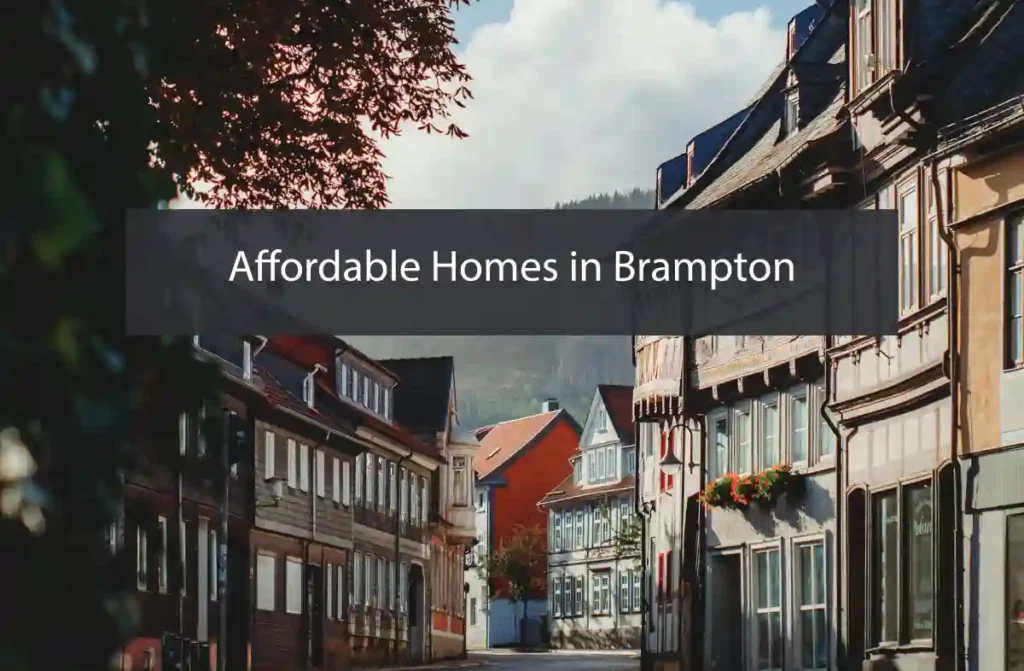Explore affordable housing in Ontario. Discover budget-friendly options and expert advice to find your perfect home in Ontario’s competitive market.
Understanding Affordable Housing in Ontario
Main objectives of the study The subject of the research is Affordable Housing in Ontario within the region of Ontario in Canada In the context of the established goal, the following objectives should be met: Housing that is considered to be affordable is one that may be paid with amount not more than 30% of the gross income of the owning household. This threshold is to protect people’s residual income to cater for other needs such as food, transport, and medical expenses among others.
Ontario’s government applies different measures to define Affordable Housing in Ontario. Some of the criteria include income standards which are derived from a certain median income of a certain region and definitive housing expenses such as rents or mortgages among others. For example, rent-geared-to-income (RGI) housing units deal with the possibility of updating the rent amount according to the tenant’s income status, so that the housing will be accessible for low income earners.
Here are some of the options of the Affordable Housing in Ontario that is currently in Ontario. This one is public housing, non profit housing, co-operative housing, any type of building that offer srental units at below market price falls under social housing. There are subforms, RhP units that are another one, where the rent is calculated as a dependent on the income of the tenant. There are also affordable homeownership programme meant to complement low-income and middle-income earners to be able to own homes through subsidises, grants or concessions on the interest rates of the mortgages.
Housing that is accessible by the general populace is very important for any economy to be stable besides promoting the welfare of societies. The subjects access to Affordable Housing in Ontario will help the Ontario government to decrease the rates of homelessness, decrease poverty levels and increase inclusiveness in the society. Housing is firmly correlated with higher standards of health, improved schooling results for children and better upkeep of employment stability among the populations. As a result, all of these factors positively impact the economic development and stability of the province as well as taxpayers’ mutual cooperation within society.

Government Programs and Initiatives
In this case, the Ontario government as well as other organizations have provided policies that aim at enhancing Affordable Housing in Ontario. These actions’ goal is to help low to moderately –income households, seniors and the disabled secure adequate and affordable homes. Some of the most popular programs include the Ontario Renovates Program, Investment in Affordable Housing in Ontario (IAH) program, and the Canada-Ontario Housing Benefit.
The Ontario Renovates Program aims at providing financing to the low-income earners who want to renovate their house for either improving the living standards or making the house fit for occupancy by a particular group of the population. Approved candidates can get free money or ‘zero interest loans’ for improvements that are minor, energy-related, or aimed at providing disabled access. To participate, one needs to obtain a consent of the local service manager, prove income status, and sometimes satisfy the requirements for meeting the program’s standards.
Another major programme is the scheme of Investment in Affordable Housing (IAH) aimed at increasing the number of Affordable Housing in Ontario and upgrade of existing stock. IAH comprises of several projects that include, the construction of a new house, a project for renovating a house or delivering a rent. As it is the case with the IAH programs, one is likely to be restricted by income status, household and housing. The applications are typically run either by the local municipality or a non-profit organisation that obtains grant together with the provincial level.
The Canada-Ontario Housing Benefit is an agreement between the Canadian federal and Ontario provincial governments which intended to offer direct money assistance to the low-income tenants. This benefit assists in filling the gap between the going rates in the market and the amount of money that families can possibly search for or be ready to pay for a house in a single instance, thus making it easier for many families to secure tenancy for homes. The criteria include the appropriate income levels and the applicant’s housing situation; one has to use the service managers or the housing providers.
An assortment of these programs have helped change many lives all over the Ontario region. For example, a family from Toronto which had recently faced the problem of high rents can now be relieved due to the received Canada-Ontario Housing Benefit. Likewise, a couple of seniors in Ottawa got the Ontario Renovates Program that enabled them to put a ramp and make their home wheelchair accessible.
Through awareness and application of these government programs and strategies, residents of Ontario can be able to get proper assistance in finding proper and affordable houses and hence enhance social wellbeing of the residents in Ontario.

Tips for Finding Affordable Housing
It is thus evident that it is very difficult to secure cheap houses to let in Ontario without the correct assistance. The first step should be to establish the nature of the housing market so as to have adequate knowledge and information on the area. Be informed of average rent, extent of vacancy rates and people’s preference for locations. Quite often up-to-date information can be found on the websites that are devoted to the sale or renting of houses and apartments as well as on the housing forums.
One should therefore use, internet based housing registries and databases to ease your search. Some of the common agencies that advertise affordable homes for rent include Ontario’s Housing Services Corporation and Municipal based regional websites. It can assist you in locating choices that you could afford and the areas that are popular among investors. Moreover, special housing websites should be subscribed in order to receive e-mails with the new offers.
Getting help from the housing agencies within the local community and non-profit organizations is always helpful. Some central resources that can be used are the Ontario Non-Profit Housing Association (ONPHA) and centres for housing help. These agencies can offer client advice on the real estate market trend & insight, the procedure of obtaining subsidies and other issues arising from tenants’ rights.
Results of the study show that preparation is necessary for the task of applying for Affordable Housing in Ontario. Prepare all sort of documents in advance, including income proof, identification, and references. Another issue that has to be taken into consideration is the clarification of the rights of tenants. Be knowledgeable on the Ontario’s Residential Tenancies Act so that you have an idea of what the law entitles and disallows in the event you are a tenant.
Budgeting is paramount in housing as it determines the repayment capacity and the amount that can be afforded on rent. Prepare your personal budget that will detail your income and expenditures, in this way you will be able to find out how much of your money can be spent on renting. Search for ways to cut down your other living costs and if that does not help, consult a finance expert.
If one conducts research to understand the problem, explores the prevailing options, and plans to the best of his/her ability, it becomes easier to find an affordable house to let in Ontario. The outlined strategies can go a long way in improving your localization of a home that meets your requirements and your pocket.
Conclusion
Proximity housing in Ontario is central to the production of socially sustainable neighbourhoods. In this blog, we have discussed about Affordable Housing in Ontario with reference to the types; advantages; as well as the sources and supports by which people and families can qualify for a house. Since being a fundamental necessity, shelter cannot be overemphasized; it is not only a place to lay one’s head, but it is the key to improving the quality of life, economic stability, and social well-being.
We urge you to take active role in searching for housing- namely, Affordable Housing in Ontario. Use the resources and programs that are above mentioned, and do not think twice before consulting the authorities on housing or any community organization. This way you will avoid guess work and enhance your chances of acquiring a house that will suit you and your pocket. Never forget that affordable housing is not only for the benefit of the self but for the enhancement of societal values of the communities of Ontario.
Frequently Asked Questions (FAQs)
Q1: Who is eligible for affordable housing in Ontario?
The following factors determine the qualifying criteria for Affordable Housing in Ontario; Although different, each program/housing provider has different qualifications they look into before approving you to get an affordable house. Typically, it is calculated via the yearly income of a person, the number of persons in the household, and the domicile. Specifically, programs are established for low and moderate income families, seniors, and the disabled persons. Please refer with your local housing authority or you may verify with the specific program for the proper eligibility requirements.
Q2: How do I apply for affordable housing?
Getting a house that is cheap to pay can be done in different ways depending on the type of program being followed. Generally, you will be required to fill a contact form, supply evidence of the income level and other relevant documents. Some of the programs may have waiting lists and therefore enrolment should be done early enough and the application files should be accurate. Health care providers managing the health problems may be contacted for guidance and understanding of the detailed procedures.
Q3: What challenges might I face when seeking affordable housing?
The common issues clients face include; long waiting list, rigorous admission criteria and shortage of the housing units. Housing may also be costly depending on the area that you prefer to live in. To overcome such difficulties, get acquainted with the various programs, be ready to compromise your choice of housing, and go for organizations that will help you find housing and also fight for your rights to be housed.
Q4: Are there any resources to help me with the application process?
Yes many resources to help with applying for cheap houses are available. Housing authorities at the local level, relevant organizations, and websites usually offer brochures, forms to fill in, tips, and other relevant information. Also, there are agencies that conduct workshops or personal consultation to assist you in the process most advantageously.





